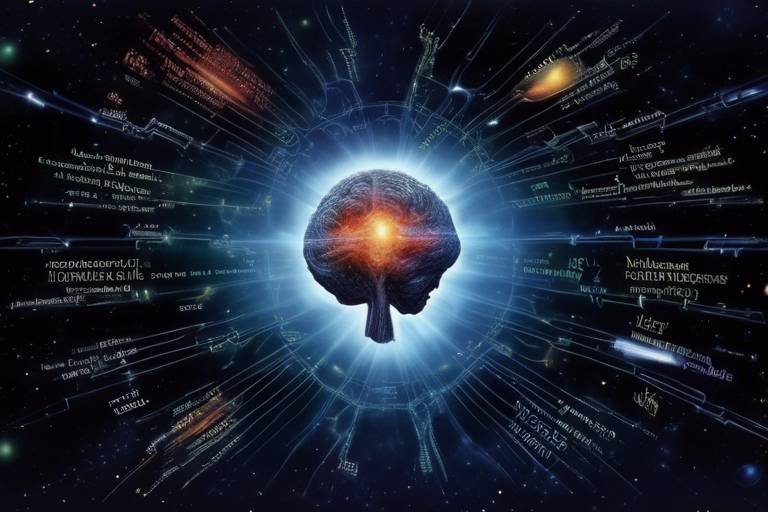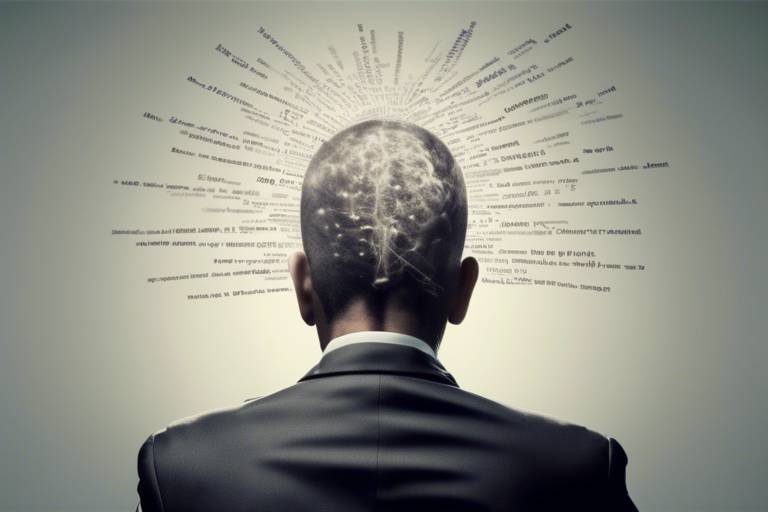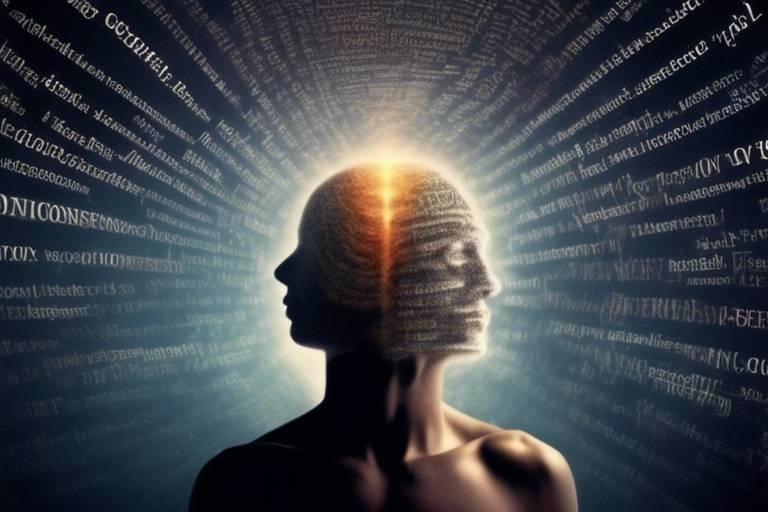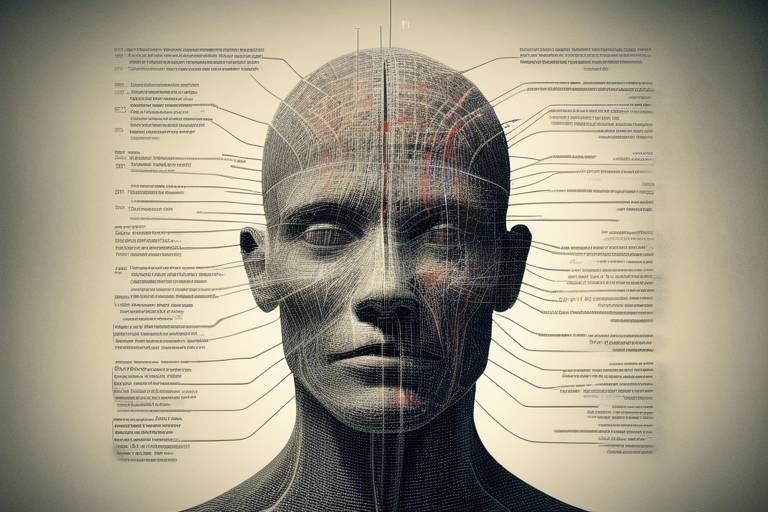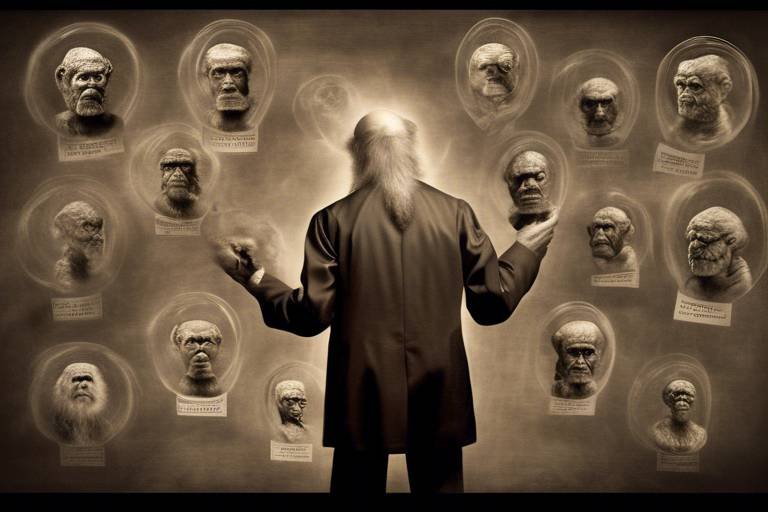Mind vs Matter - A Philosophical Discourse
The relationship between consciousness and physical existence has been a topic of profound interest and debate throughout human history. The question of whether our minds shape reality or if reality exists independently of our perceptions is not just a philosophical quandary; it’s a fundamental inquiry into the nature of existence itself. As we delve into this intricate relationship, we’ll explore various philosophical perspectives that illuminate the complexities of our consciousness and the tangible world around us.
Understanding consciousness is essential in the mind-matter debate. But what exactly is consciousness? Is it merely a byproduct of brain activity, or does it hold a deeper significance? Philosophers and scientists alike have struggled to define this elusive phenomenon. Some argue that consciousness is the essence of our being, a unique aspect that separates us from the mere physical processes of the universe. Others contend that it is simply a complex interplay of biochemical reactions within the brain.
To grasp the implications of consciousness, we must consider various theories that attempt to explain it. For instance, the philosophical implications of consciousness suggest that our awareness shapes our reality. This leads us to ponder questions like: If our thoughts influence our surroundings, to what extent do we create our own reality? This philosophical inquiry does not just stop at theoretical discussions; it extends into practical implications, affecting how we live our lives and perceive our experiences.
At the heart of the mind-matter discourse lies the contrast between materialism and idealism. Materialism posits that only physical matter exists, emphasizing the tangible aspects of the universe as the foundation of reality. In contrast, idealism argues that reality is fundamentally mental, suggesting that our perceptions and thoughts shape the world around us. This fundamental clash of ideas raises significant questions about existence and perception.
When we consider the implications of each viewpoint, we find that materialism often leads to a more scientific approach, focusing on empirical evidence and observable phenomena. Idealism, on the other hand, invites us to explore the subjective nature of experience, emphasizing the role of the mind in interpreting reality. As we navigate these contrasting perspectives, we begin to understand how they influence our understanding of existence and our place within it.
Exploring the evolution of materialist thought reveals a rich tapestry of ideas and contributions from key philosophers. From ancient thinkers like Democritus, who introduced the concept of atomism, to contemporary philosophers who continue to shape the discourse, the journey of materialism is fascinating. Democritus suggested that all matter is composed of indivisible particles, laying the groundwork for modern materialist philosophy and scientific inquiry.
In modern times, materialism has evolved to incorporate scientific advancements, focusing on physical processes that underpin our understanding of consciousness. This evolution raises questions about how contemporary science influences materialist philosophy and our grasp of reality. As we examine these developments, we see how the interplay between science and philosophy continues to shape our understanding of existence.
Democritus's introduction of atomism was revolutionary. He proposed that everything in the universe is made up of tiny, indivisible particles called atoms. This foundational concept not only influenced the trajectory of materialist philosophy but also paved the way for modern scientific inquiry. Imagine the universe as a vast puzzle, with atoms as the individual pieces that come together to form the intricate picture of reality. This analogy helps us appreciate the significance of atomism in our quest to understand the physical world.
Today, modern materialism embraces the advancements of science, focusing on the physical processes that govern our existence. This approach emphasizes the importance of empirical evidence and observable phenomena in understanding consciousness. As we delve into the implications of modern materialism, we find ourselves grappling with profound questions about the nature of reality and the essence of our consciousness.
On the flip side of the coin, idealism posits that reality is shaped by the mind. Various forms of idealism, including subjective and objective idealism, offer intriguing perspectives on existence and perception. Subjective idealism suggests that reality is fundamentally shaped by individual experiences, while objective idealism posits that the mind plays a crucial role in shaping the collective reality we experience. This exploration invites us to consider the profound implications of our perceptions and thoughts in shaping the world around us.
The mind-body problem addresses the intricate relationship between mental states and physical processes. This complex issue has sparked numerous theories, including dualism and physicalism. Dualism, famously advocated by René Descartes, posits that the mind and body are distinct entities. However, this view faces significant challenges, particularly regarding the interaction problem—how can two distinct entities influence each other?
On the other hand, physicalism argues that everything, including consciousness, can be explained in physical terms. This perspective raises essential questions about the nature of the mind and its relationship to the physical world. As we delve deeper into these theories, we uncover the profound implications for our understanding of consciousness and existence.
While dualism offers a compelling perspective, it is not without its challenges. Critics argue that the interaction problem poses a significant hurdle for dualist theories. If the mind and body are separate, how do they interact? This question invites us to reconsider our understanding of consciousness and the nature of reality. The critiques from materialist perspectives further complicate the discourse, urging us to explore alternative explanations for the mind-body relationship.
In contrast, physicalism provides a more unified approach, arguing that everything can be explained through physical processes. This perspective has significant implications for our understanding of consciousness, suggesting that our thoughts and experiences are ultimately rooted in the physical world. As we explore the nuances of physicalism, we begin to appreciate the intricate relationship between mind and matter.
The mind-matter discourse has profound implications for both science and philosophy. The debates surrounding consciousness and reality influence not only our understanding of human experience but also the direction of scientific research. As we engage with these philosophical inquiries, we find ourselves at the intersection of science and philosophy, where the complexities of existence unfold before us.
- What is the mind-body problem? The mind-body problem explores the relationship between mental states and physical processes, questioning how they interact and influence each other.
- What are the main differences between materialism and idealism? Materialism posits that only physical matter exists, while idealism argues that reality is fundamentally shaped by the mind and perceptions.
- Who were some key philosophers in the development of materialism? Philosophers like Democritus, Karl Marx, and contemporary thinkers have significantly contributed to the evolution of materialist thought.
- How does modern science influence materialist philosophy? Modern science provides empirical evidence and insights that shape our understanding of consciousness and the physical world, reinforcing materialist perspectives.

The Nature of Consciousness
Understanding consciousness is essential in the mind-matter debate. It's like trying to grasp the essence of a dream while still awake; it’s elusive yet profoundly impactful. Consciousness is often defined as the state of being aware of and able to think about one's own existence and the surrounding world. But what does it really mean to be conscious? Philosophers, neuroscientists, and psychologists have been wrestling with this question for centuries, each offering their own perspectives and theories.
At its core, consciousness encompasses various aspects, including perception, thought, and self-awareness. It’s like a multi-layered cake, with each layer representing different elements of our mental experience. Some argue that consciousness is a byproduct of brain activity, while others believe it exists independently of the physical brain. This leads us to ponder: is consciousness merely an illusion, or is it a fundamental aspect of reality? The implications of these questions are staggering, influencing not just philosophy but also fields like psychology, cognitive science, and even artificial intelligence.
One of the major theories surrounding consciousness is the theory of dualism, famously articulated by René Descartes. Dualism posits that the mind and body are distinct entities that interact in complex ways. Imagine a puppet and its strings; while the puppet (the body) moves, it is the strings (the mind) that direct its actions. This perspective raises intriguing questions about how non-physical mental states can influence physical actions. On the flip side, we have physicalism, which argues that everything, including consciousness, can be explained through physical processes. This view suggests that our thoughts and feelings are nothing more than the firing of neurons and biochemical reactions in the brain.
To further complicate matters, we also encounter various philosophical implications regarding the nature of consciousness. For instance, the concept of qualia refers to the subjective experiences of individuals, such as the way one perceives the color red or the taste of chocolate. These experiences are deeply personal and cannot be fully communicated to another person, leading to debates about whether they can be adequately explained through physical means. This brings us back to the question: can consciousness be reduced to mere physical processes, or is there something inherently unique about our mental experiences?
In summary, the nature of consciousness is a complex and multifaceted topic that continues to captivate thinkers across various disciplines. As we explore the depths of our own awareness, we must ask ourselves: are we merely products of our physical bodies, or do our minds hold a power that transcends the material world? The journey to understanding consciousness is not just an academic pursuit; it’s a quest that touches the very essence of what it means to be human.
- What is consciousness? Consciousness is the state of being aware of and able to think about one's own existence and surroundings.
- What are the main theories of consciousness? The two primary theories are dualism, which posits the mind and body as separate entities, and physicalism, which argues that everything can be explained through physical processes.
- What are qualia? Qualia are the subjective experiences of individuals, such as how one perceives colors or tastes, which are deeply personal and difficult to communicate.
- Can consciousness exist independently of the brain? This is a subject of debate; some believe consciousness is a byproduct of brain activity, while others argue it may exist independently.

Materialism vs Idealism
The debate between materialism and idealism is one of the most intriguing dialogues in philosophy, shaping our understanding of reality and existence. At its core, materialism asserts that only physical matter truly exists, while idealism posits that reality is fundamentally shaped by our mental perceptions. This fundamental clash raises profound questions about the nature of existence itself. Are we merely biological machines, or is there something more profound at play in our consciousness?
Materialism, often associated with a scientific worldview, argues that everything we experience can be traced back to physical processes. Think of it as a grand puzzle where every piece is a tangible object or a measurable phenomenon. This perspective has significant implications for our understanding of the universe, suggesting that everything from thoughts to emotions can ultimately be explained through the lens of physics and biology. For example, when you feel joy, a materialist would argue that this sensation is the result of chemical reactions in your brain, a series of neurons firing in response to stimuli. This view, while grounded in observable reality, raises questions about the richness of human experience. Can the essence of love or the depth of sorrow be reduced to mere chemical interactions?
On the other hand, idealism offers a contrasting perspective that emphasizes the primacy of the mind. Idealists argue that our perceptions shape our reality. Imagine walking through a vibrant forest; the beauty you perceive is not just a collection of trees and leaves but a manifestation of your consciousness interacting with the world. This perspective suggests that without a mind to perceive it, the physical world may not hold the same significance. Idealism invites us to consider the role of subjective experience in shaping our understanding of existence. It raises the tantalizing possibility that reality is not just a backdrop for our lives but is actively constructed by our thoughts, beliefs, and perceptions.
To illustrate the differences between these two philosophical stances, consider the following table:
| Aspect | Materialism | Idealism |
|---|---|---|
| Core Belief | Only physical matter exists. | Reality is fundamentally mental. |
| View of Consciousness | A byproduct of physical processes. | Central to the construction of reality. |
| Implications for Science | Supports a scientific approach to understanding the universe. | Encourages exploration of subjective experiences. |
| Philosophical Challenges | Can consciousness be fully explained through matter? | How do we reconcile subjective experiences with a physical world? |
As we navigate through this philosophical landscape, it's essential to recognize that both materialism and idealism offer valuable insights into the nature of existence. They each highlight different aspects of the human experience, urging us to consider the interplay between the physical and the mental. The question remains: can we ever fully understand the relationship between mind and matter? Or are we destined to exist in a perpetual state of inquiry, where both perspectives coexist, each illuminating different facets of our reality?
In conclusion, the materialism versus idealism debate is not merely an academic exercise; it has real-world implications for how we perceive ourselves and our place in the universe. Whether we lean towards one philosophy or the other, the exploration of these ideas enriches our understanding of existence and consciousness, inviting us to delve deeper into the mysteries of life.
- What is materialism? Materialism is the philosophical viewpoint that only physical matter exists and that everything, including consciousness, can be explained in terms of physical processes.
- What is idealism? Idealism posits that reality is fundamentally shaped by our mental perceptions and that the mind plays a crucial role in constructing our understanding of existence.
- Can consciousness be fully explained by materialism? This remains a contentious question, as many argue that subjective experiences cannot be entirely reduced to physical explanations.
- How do materialism and idealism influence science? Materialism supports scientific inquiry focused on physical phenomena, while idealism encourages exploration of subjective experiences and their significance in shaping reality.

Historical Perspectives on Materialism
The journey of materialist thought is rich and intricate, spanning centuries and evolving with the tides of scientific discovery and philosophical inquiry. From the ancient Greeks to modern thinkers, the discourse surrounding materialism has shaped our understanding of the physical world and our place within it. At its core, materialism asserts that everything that exists is made up of matter, and this perspective has undergone significant transformations over time.
One of the earliest proponents of materialism was Democritus, a Greek philosopher who lived around 460-370 BCE. He introduced the groundbreaking idea of atomism, positing that all matter is composed of tiny, indivisible particles called atoms. This concept was revolutionary, as it suggested that the universe is not a chaotic amalgamation of substances but rather a structured entity governed by natural laws. Democritus’ ideas laid the groundwork for future scientific exploration and materialist philosophy, influencing thinkers for generations to come.
Fast forward to the Enlightenment, a period that saw a surge in scientific inquiry and skepticism towards traditional beliefs. Philosophers like Thomas Hobbes and John Locke further developed materialist thought by emphasizing the importance of sensory experience and the physical basis of knowledge. Hobbes, in particular, argued that everything, including human thoughts and emotions, could be explained in terms of physical processes. This was a significant shift from earlier metaphysical perspectives, as it anchored human experience firmly within the realm of the material world.
In the 19th century, the rise of scientific materialism marked a pivotal moment in the history of this philosophical discourse. With the advent of modern science, thinkers like Karl Marx and Friedrich Engels applied materialist principles to social and political theory, arguing that material conditions shape human consciousness and societal structures. Their work emphasized the interconnectedness of material existence and human experience, arguing that our understanding of reality must consider the socio-economic factors that influence our lives.
As we moved into the 20th century, the development of quantum mechanics and advancements in neuroscience further complicated the materialist narrative. The question of how consciousness arises from physical processes became a central focus of inquiry, leading to debates between materialists and those who advocate for alternative perspectives, such as dualism. The implications of these discussions are profound, as they challenge our understanding of free will, identity, and the nature of existence itself.
In summary, the historical perspectives on materialism reveal a dynamic interplay between philosophy and science. The evolution of materialist thought has been marked by key figures and transformative ideas that have shaped our understanding of reality. As we continue to explore the intricacies of consciousness and existence, the dialogue between materialism and its alternatives remains as relevant as ever, inviting us to question the very nature of what it means to be human.
- What is materialism? Materialism is a philosophical viewpoint that asserts that only physical matter exists and that everything, including consciousness, can be explained in terms of physical processes.
- Who were the key figures in the development of materialist thought? Key figures include Democritus, Thomas Hobbes, John Locke, Karl Marx, and Friedrich Engels, each contributing to the evolution of materialism in unique ways.
- How does materialism relate to consciousness? Materialism posits that consciousness arises from physical processes in the brain, while alternative perspectives like dualism argue for a distinction between mind and body.
- What are the implications of materialism for science? Materialism influences scientific research by grounding inquiries in observable phenomena and emphasizing the importance of empirical evidence in understanding reality.

Democritus and Atomism
Democritus, often hailed as the father of atomism, was a pivotal figure in ancient philosophy, whose ideas laid the groundwork for both modern science and materialist thought. Living in the 5th century BCE, he proposed that everything in the universe is composed of tiny, indivisible particles called atoms. This revolutionary concept challenged the prevailing notions of his time, which were heavily influenced by more mystical or spiritual explanations of matter and existence.
Imagine the universe as a vast, intricate puzzle. According to Democritus, the pieces of this puzzle are the atoms—small, unchangeable units that combine in various ways to form all the objects and phenomena we observe. His assertion that these atoms are eternal and indestructible was groundbreaking, positing that the physical world is not a chaotic blend of elements but rather a structured assembly of fundamental building blocks. This idea was not just a scientific hypothesis; it was a radical shift in understanding the very nature of reality.
Democritus contrasted his atomistic view with the teachings of his contemporaries, who often believed in the existence of essential qualities and substantial forms that defined matter. For him, the properties of objects were merely the result of how these atoms interacted with one another. This leads us to consider the implications of his thought:
- Reductionism: The belief that complex phenomena can be understood by examining their simpler components.
- Materialism: The view that only physical matter exists and that everything can be explained in terms of interactions between atoms.
- Determinism: The idea that all events, including thoughts and actions, are determined by previously existing causes, which can be traced back to atomic interactions.
While Democritus's ideas were revolutionary, they faced skepticism from various philosophers, particularly Aristotle, who favored a more qualitative understanding of nature. Nonetheless, the seeds of atomism planted by Democritus would eventually flourish, influencing not only later philosophical discourse but also the scientific revolution centuries later.
In the context of scientific inquiry, Democritus's atomism paved the way for the development of modern physics. The concept of atoms as the fundamental constituents of matter has been validated by centuries of research, culminating in the atomic theory that underpins chemistry today. It's fascinating to think that the curiosity and intellect of a philosopher from ancient Greece could echo through the ages, shaping our understanding of the universe.
In conclusion, Democritus's atomism represents a critical juncture in the history of thought, merging philosophy with what would become the scientific method. His vision of a universe composed of indivisible particles not only challenged the status quo of his time but also laid the groundwork for future explorations into the nature of reality itself.

Modern Materialism
In the realm of philosophy, has emerged as a robust framework that seeks to explain the universe through the lens of physical processes and empirical evidence. This contemporary approach builds upon the foundational ideas of earlier materialist thinkers, integrating advancements in science and technology to offer a more nuanced understanding of reality. At its core, modern materialism asserts that everything, including consciousness, can be understood through the interactions of matter and energy.
One of the most significant shifts in modern materialism is the incorporation of scientific discoveries. For instance, the advent of neuroscience has provided profound insights into how brain activity correlates with mental states. This has led to a growing consensus among scientists and philosophers alike that our thoughts, emotions, and perceptions are not separate from the physical processes occurring in our brains. In fact, many argue that consciousness itself is a byproduct of complex biochemical interactions. This notion challenges traditional views that regard the mind as an ethereal entity, separate from the body.
Moreover, modern materialism emphasizes the importance of empirical evidence and the scientific method. Philosophers such as Daniel Dennett and Patricia Churchland have championed this perspective, arguing that understanding consciousness requires a rigorous, evidence-based approach. They assert that by studying the brain's mechanisms, we can unravel the mysteries of human experience. This has significant implications for fields such as psychology, cognitive science, and even artificial intelligence, as it encourages a model where cognitive functions can be replicated and understood through physical processes.
However, modern materialism is not without its challenges. Critics often point to the subjective nature of experience—the qualia, or the individual instances of subjective, conscious experience—as a significant hurdle that materialist explanations struggle to address. How can something as intangible as consciousness arise from mere physical interactions? This question keeps the debate alive, pushing both scientists and philosophers to explore deeper into the nature of reality.
In summary, modern materialism represents a dynamic interplay between philosophy and science, where the exploration of consciousness is grounded in the physical world. It invites us to reconsider our understanding of existence, urging us to look beyond the surface and examine the intricate connections between mind and matter. As we continue to unravel the complexities of consciousness, modern materialism stands as a testament to the power of inquiry and the relentless pursuit of knowledge.
- What is modern materialism? Modern materialism is a philosophical perspective that explains reality through physical processes and empirical evidence, asserting that everything, including consciousness, can be understood in terms of matter and energy.
- How does modern materialism relate to consciousness? Modern materialism posits that consciousness arises from complex biochemical interactions in the brain, challenging the notion that the mind is separate from the body.
- Who are some key figures in modern materialism? Notable philosophers like Daniel Dennett and Patricia Churchland have significantly contributed to the discourse on modern materialism and consciousness.
- What are the criticisms of modern materialism? Critics argue that modern materialism struggles to explain the subjective nature of experience, particularly the phenomenon of qualia.

Exploring Idealism
When we dive into the realm of idealism, we enter a fascinating world where the mind takes center stage. Idealism is the philosophical view that reality is fundamentally shaped by our perceptions and consciousness. Imagine a painter standing before a blank canvas; the colors and shapes they choose to splash onto that canvas are influenced by their thoughts, feelings, and experiences. In much the same way, idealists argue that our understanding of reality is colored by our mental states.
At its core, idealism posits that the physical world is not the primary reality; rather, it is a construct of the mind. This leads us to consider two main branches of idealism: subjective idealism and objective idealism. Subjective idealism suggests that reality is dependent on individual consciousness. Think of it as each person holding a unique lens through which they view the world. For instance, the way a child perceives a sunny day may differ vastly from an elderly person who associates it with nostalgia. On the other hand, objective idealism proposes that while our perceptions may differ, there exists a universal mind or consciousness that shapes reality itself. This notion raises intriguing questions about the nature of truth and existence.
One might wonder, how do these perspectives influence our daily lives? Well, consider this: if reality is shaped by our thoughts, then our beliefs and attitudes can significantly alter our experiences. For example, someone with a positive outlook may find joy in simple pleasures, while a pessimistic individual might overlook those same moments. This idea resonates with the old adage, "perception is reality," highlighting the power of the mind in shaping our experiences.
Furthermore, idealism challenges the notion of a purely material world. It encourages us to explore the implications of consciousness in understanding existence. As we navigate through life, we constantly interact with our environment, but how much of that interaction is influenced by our mental state? This question invites a deeper examination of how we perceive reality and our place within it.
To illustrate the differences between subjective and objective idealism, consider the following table:
| Type of Idealism | Description |
|---|---|
| Subjective Idealism | Reality is dependent on individual consciousness; each person's perception creates their own reality. |
| Objective Idealism | Reality is shaped by a universal consciousness or mind, suggesting a shared reality beyond individual perceptions. |
In conclusion, exploring idealism opens up a treasure trove of questions about the nature of reality and our understanding of existence. It invites us to reflect on how our thoughts and beliefs shape our experiences and emphasizes the profound connection between the mind and the world around us. As we continue to unravel the complexities of idealism, we are reminded that our perceptions are not just reflections of the world but also powerful forces that shape it.
- What is the main idea of idealism?
Idealism posits that reality is fundamentally shaped by our perceptions and consciousness, suggesting that the mind plays a crucial role in defining existence. - How does subjective idealism differ from objective idealism?
Subjective idealism argues that reality is dependent on individual consciousness, while objective idealism suggests that a universal mind shapes reality, creating a shared existence. - What are the implications of idealism in everyday life?
Idealism emphasizes that our beliefs and attitudes can significantly alter our experiences, highlighting the importance of perception in shaping reality.

The Mind-Body Problem
The mind-body problem is one of the most intriguing and perplexing issues in philosophy, and it dives deep into the relationship between our mental states and the physical processes that govern our bodies. Imagine for a moment that your mind is like a radio station, broadcasting thoughts and feelings while your body acts as the receiver, interpreting those signals. But how exactly do these two seemingly separate entities interact? This question has puzzled thinkers for centuries, leading to various theories that attempt to bridge the gap between the mental and the physical.
At the heart of the mind-body problem lies a fundamental inquiry: Are the mind and body distinct entities, or are they two aspects of the same phenomenon? This debate has led to the development of several philosophical perspectives, including dualism and physicalism. Dualism, famously championed by René Descartes, asserts that the mind and body are fundamentally different substances. Descartes famously said, "Cogito, ergo sum" (I think, therefore I am), emphasizing the primacy of the mind. But this view raises a critical challenge: If the mind is non-physical, how does it interact with the physical body? This question, often referred to as the "interaction problem," has left many philosophers scratching their heads.
On the other hand, physicalism presents a more unified approach, arguing that everything, including consciousness, can be explained through physical processes. This perspective suggests that our thoughts, emotions, and experiences are ultimately rooted in the biological and chemical functions of our brains. Imagine a complex machine where every cog and gear represents a different aspect of our consciousness, all working together to produce the symphony of human experience. But does this reductionist view strip away the richness of our mental lives? Many critics argue that it does, contending that understanding the brain's mechanisms doesn't fully capture the essence of what it means to be conscious.
To further complicate the discussion, we also encounter various theories that attempt to reconcile these two perspectives. For instance, some philosophers propose a form of emergentism, where consciousness emerges from complex physical systems but remains distinct from them. This idea suggests that while our mental states are rooted in physical processes, they can take on a life of their own, much like how the ocean's waves are shaped by the wind yet possess their own unique patterns. Such theories invite us to consider the possibility that the mind and body are not merely separate entities but are intricately intertwined in ways we have yet to fully understand.
As we delve deeper into the mind-body problem, we must also consider the implications of these philosophical debates on our everyday lives. How do our beliefs about the mind and body influence our understanding of mental health, consciousness, and even the nature of reality itself? The answers to these questions can shape everything from therapeutic practices in psychology to advancements in neuroscience. It’s a fascinating interplay that highlights the importance of this philosophical discourse in shaping our understanding of human experience.
- What is the mind-body problem? The mind-body problem explores the relationship between mental states and physical processes, questioning whether they are distinct entities or aspects of the same phenomenon.
- Who proposed dualism? Dualism was famously advocated by René Descartes, who argued that the mind and body are fundamentally different substances.
- What is physicalism? Physicalism is the view that everything, including consciousness, can be explained in terms of physical processes and properties.
- How do these theories impact our understanding of mental health? Theories about the mind-body relationship can influence therapeutic approaches and our understanding of consciousness and mental well-being.

Dualism and Its Challenges
Dualism, a term that often sparks intense debates, was famously championed by the French philosopher René Descartes. At its core, dualism posits that the mind and body are fundamentally distinct entities. This perspective suggests that our mental states—thoughts, feelings, and consciousness—exist independently of our physical bodies. Imagine the mind as a pilot navigating a ship, where the ship represents the body. While the pilot can steer the ship, the ship itself operates under different principles governed by physical laws. This analogy illustrates the dualistic view that our mental and physical experiences are separate yet interconnected.
However, the dualistic framework is not without its challenges. One of the most pressing issues is the infamous "interaction problem." If the mind and body are indeed separate, how do they interact? For instance, when we decide to move our arm (a mental choice), how does that decision translate into physical movement? This conundrum raises profound questions about the mechanisms of interaction and has led many philosophers to critique dualism as lacking in explanatory power.
Moreover, critiques from materialist perspectives have gained traction over the years. Materialists argue that all phenomena, including consciousness, can be explained through physical processes alone. They assert that mental states are merely byproducts of brain activity, dismissing the notion of a separate, non-physical mind. This perspective challenges the very foundation of dualism, suggesting that the mind cannot exist independently of the body. To illustrate, consider the advancements in neuroscience, which have shown how changes in brain chemistry can influence thoughts and emotions, further blurring the lines between mind and body.
As we delve deeper into the implications of dualism, it’s essential to recognize the variety of dualistic theories that have emerged over time. For example, substance dualism posits that mind and body are made of different substances, while property dualism suggests that although they may share the same substance, they possess different properties. Each of these theories presents unique challenges and sparks further inquiry into the nature of consciousness and existence.
In summary, while dualism offers a compelling framework for understanding the relationship between mind and body, it faces significant challenges. The interaction problem and critiques from materialism highlight the complexities involved in reconciling mental and physical experiences. As we continue to explore these philosophical waters, it becomes clear that the dialogue surrounding dualism is far from over. Each challenge invites deeper scrutiny and encourages us to rethink our assumptions about consciousness and existence.
- What is dualism? Dualism is the philosophical view that the mind and body are distinct and separate entities.
- Who is the most famous proponent of dualism? René Descartes is the most notable advocate of dualism.
- What is the interaction problem? The interaction problem questions how two distinct entities, the mind and body, can interact with one another.
- How do materialists view consciousness? Materialists believe that consciousness can be fully explained through physical processes and brain activity.

Physicalism and Consciousness
Physicalism is a fascinating viewpoint that proposes everything in existence, including consciousness, can be understood through physical processes. Imagine for a moment that our thoughts, feelings, and experiences are like shadows cast by the physical world. Just as shadows are shaped by the objects that create them, our mental states are influenced by the tangible, material aspects of our lives. This perspective challenges us to consider the profound implications of viewing consciousness as an emergent property of physical systems, rather than something separate or distinct.
At its core, physicalism asserts that the mind is not an ethereal entity but rather a product of brain activity. This leads us to ponder: can we truly reduce the richness of human experience to mere neural interactions? Advocates of physicalism argue that advancements in neuroscience provide compelling evidence that our thoughts and emotions are intricately linked to brain states. For example, when we experience joy, specific neural pathways light up, creating a physical representation of that emotion. This idea is akin to a symphony, where each instrument (or neuron) plays a crucial role in creating a harmonious experience.
However, the journey into understanding consciousness through a physicalist lens is not without its challenges. One major question arises: if consciousness is solely a product of physical processes, what happens to the subjective quality of our experiences? How do we account for the 'what it's like' aspect of being aware? To illustrate, consider the difference between knowing the mechanics of a beautiful painting and actually experiencing the emotions it evokes. This dilemma is often referred to as the 'explanatory gap,' highlighting the struggle to reconcile our inner experiences with a purely physical explanation.
Moreover, physicalism raises intriguing questions about free will and moral responsibility. If our thoughts and decisions are dictated by physical processes, to what extent are we truly in control? This philosophical inquiry can feel like a double-edged sword—while it grounds our understanding of consciousness in the physical realm, it also challenges our notions of autonomy and accountability. In essence, the physicalist view invites us to reconsider our understanding of the self, suggesting that perhaps we are more like intricate machines than we care to admit.
To better grasp the relationship between physicalism and consciousness, let's take a look at a simplified table outlining key aspects:
| Aspect | Physicalist View | Implications |
|---|---|---|
| Nature of Mind | Emergent property of physical processes | Challenges the dualistic view of mind-body separation |
| Subjective Experience | Linked to brain activity | Raises questions about the 'explanatory gap' |
| Free Will | Determined by physical processes | Impacts notions of autonomy and moral responsibility |
In conclusion, the exploration of physicalism and consciousness opens up a treasure trove of philosophical inquiries. It pushes us to examine not only the nature of our existence but also the very fabric of reality itself. As we delve deeper into this discourse, we may find that understanding consciousness through a physicalist lens enriches our appreciation of the human experience, even as it raises new questions about the essence of who we are.
- What is physicalism? Physicalism is the view that everything, including consciousness, can be explained in terms of physical processes.
- How does physicalism relate to consciousness? Physicalism posits that consciousness is an emergent property of brain activity and is not separate from the physical world.
- What are the challenges of physicalism? Challenges include the 'explanatory gap' regarding subjective experiences and questions about free will and moral responsibility.
- How does neuroscience support physicalism? Neuroscience provides evidence that mental states correlate with specific brain states, suggesting a strong link between the two.

Implications for Science and Philosophy
The intricate dialogue between mind and matter has profound implications for both science and philosophy, reshaping our understanding of reality, existence, and consciousness. As we delve into this rich discourse, we find ourselves at the crossroads of metaphysics and empirical inquiry, questioning not just what we know, but how we know it. The philosophical implications of this debate extend into the scientific realm, influencing research methodologies, interpretations of data, and even the ethical frameworks that guide our exploration of the human experience.
One of the most significant impacts of the mind-matter discourse is the way it challenges traditional scientific paradigms. For instance, if we consider the implications of idealism, which posits that reality is fundamentally shaped by our perceptions, we begin to question the very nature of scientific observation. Are we merely observers of an objective reality, or do our mental states actively shape the phenomena we study? This inquiry leads us to reconsider the role of the observer in scientific experiments, particularly in fields like quantum mechanics, where the act of measurement seems to influence outcomes.
On the flip side, materialism asserts that physical matter is the only reality, which has steered scientific inquiry towards a more reductionist approach. This perspective has propelled advancements in fields such as neuroscience and psychology, where understanding the brain's physical processes has become paramount in explaining consciousness. However, this reductionism often overlooks the subjective experience of consciousness, raising questions about whether a purely materialist view can fully account for the richness of human experience.
To further illustrate the implications of these philosophical perspectives, consider the following table that summarizes some key differences between materialism and idealism:
| Aspect | Materialism | Idealism |
|---|---|---|
| Nature of Reality | Physical matter is the only reality. | Reality is fundamentally mental. |
| Role of Consciousness | Consciousness arises from physical processes. | Consciousness shapes reality. |
| Scientific Implications | Focus on empirical data and physical laws. | Questioning the objectivity of scientific observation. |
Moreover, the implications extend beyond just scientific inquiry. They also influence our ethical considerations in research and technology. As we gain deeper insights into consciousness and the nature of existence, we must grapple with questions about the moral status of sentient beings, the ethical treatment of consciousness in artificial intelligence, and the responsibilities of scientists and philosophers alike in navigating these complex waters. For instance, if consciousness is not merely a byproduct of physical processes but a fundamental aspect of reality, how should we approach the development of AI that mimics human thought and behavior?
This philosophical discourse also invites us to explore the limits of human understanding. Are there aspects of reality that lie beyond our comprehension, and if so, what does that mean for our pursuit of knowledge? The interplay between science and philosophy encourages a humility in our quest for understanding, reminding us that while we may seek to uncover the mysteries of the universe, there may always be dimensions of existence that elude our grasp.
In conclusion, the implications of the mind-matter discourse are vast and multi-faceted, challenging us to rethink our assumptions about reality, consciousness, and the nature of existence. As we continue to explore these profound questions, the dialogue between science and philosophy will undoubtedly evolve, guiding us toward a deeper understanding of ourselves and the universe we inhabit.
- What is the mind-body problem? The mind-body problem explores the relationship between mental states and physical processes, questioning how they interact and influence one another.
- How does materialism differ from idealism? Materialism asserts that only physical matter exists, while idealism posits that reality is fundamentally shaped by the mind.
- What are the implications of consciousness in science? The understanding of consciousness influences scientific methodologies and interpretations, particularly in fields like neuroscience and quantum mechanics.
- Can consciousness exist without a physical body? This question remains a topic of philosophical debate, with various perspectives offering differing views on the relationship between consciousness and physical existence.
Frequently Asked Questions
- What is the mind-body problem?
The mind-body problem is a philosophical issue that explores the relationship between mental states and physical processes. It questions how our thoughts, feelings, and consciousness relate to our physical bodies and the material world.
- What are the main theories surrounding consciousness?
There are several theories regarding consciousness, including dualism, which suggests that mind and body are separate entities, and physicalism, which argues that everything, including consciousness, can be explained through physical processes. Each theory offers unique insights into the nature of existence and awareness.
- How do materialism and idealism differ?
Materialism posits that only physical matter exists and that everything can be explained through physical laws. In contrast, idealism argues that reality is fundamentally mental, shaped by our perceptions and consciousness. These opposing viewpoints have significant implications for our understanding of existence.
- Who were some key philosophers in the history of materialism?
Key philosophers in the evolution of materialist thought include Democritus, who introduced atomism, and later thinkers like Karl Marx and contemporary scientists who have expanded the discussion to incorporate modern scientific advancements and their implications for understanding reality.
- What challenges does dualism face?
Dualism, particularly as advocated by Descartes, faces challenges such as the interaction problem, which questions how two distinct entities (mind and body) can interact. Critics from materialist perspectives argue that dualism does not adequately explain the relationship between mental and physical states.
- How does physicalism explain consciousness?
Physicalism asserts that consciousness arises from physical processes in the brain. This view suggests that all mental states can be understood in terms of physical interactions, providing a framework for exploring consciousness through scientific inquiry.
- What implications does the mind-matter discourse have for science?
The mind-matter discourse influences scientific research by shaping the questions scientists ask about consciousness, perception, and reality. It encourages interdisciplinary approaches, merging philosophy with neuroscience and psychology to better understand human experience.





